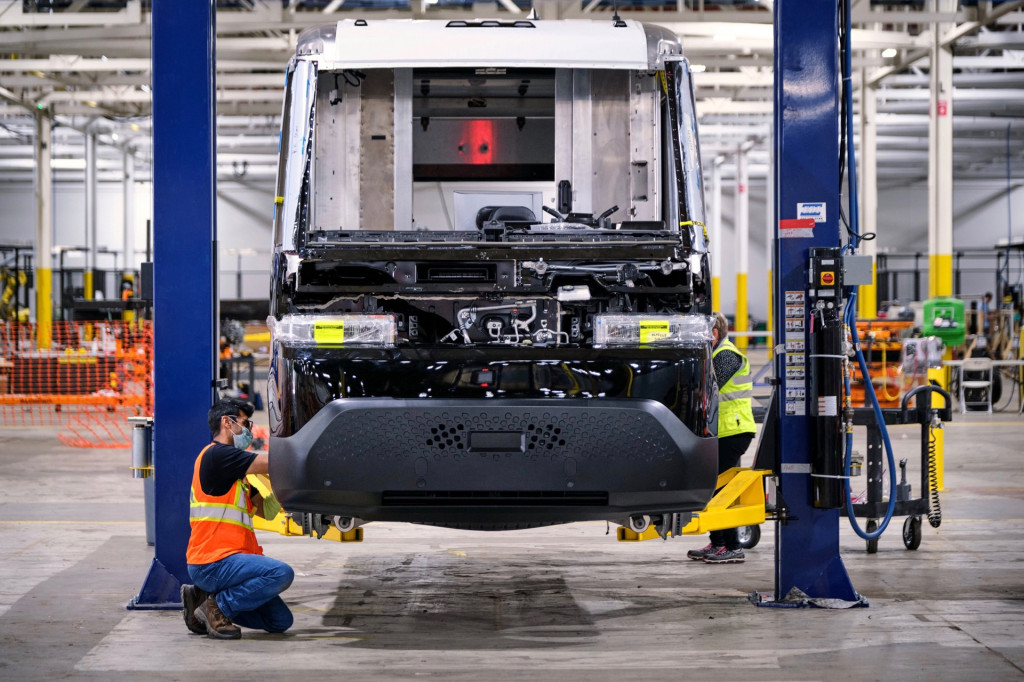On Tuesday, Canada unveiled the framework for an EV mandate for 2035.
The mandate, known as the Electric Vehicle Availability Standard, will gradually step up the amount of “zero-emission vehicles” until they account for 100% of new-car sales in Canada. It stipulates 20% zero-emission vehicle sales in 2026, and 60% in 2030 before eliminating sales of conventional internal-combustion vehicles after 2035.
BrightDrop EV600 production
For the purposes of the mandate, “zero-emission” includes battery electric, hydrogen, and plug-in electric vehicles. The latter may refer to plug-in hybrids, some of which will be allowed under a California rule that aims to otherwise ban gasoline cars by 2035.
Automakers will need to show compliance by accruing credits for sales of qualifying vehicles. They can also earn additional credits for EVs sold before 2026, as well as for building out charging infrastructure. Companies with a surplus of credits will then be able to sell them to companies that don’t meet sales targets, the CBC reported.

Rendering of Northvolt Six battery factory in Quebec, Canada
Canada has been following both the U.S. federal government and California in aspects of its EV policy. Like the U.S. it has had a nationwide EV tax credit. But an EV mandate would put Canada ahead of the U.S.
“The Electric Vehicle Availability Standard helps Canada keep pace with the United States, the United Kingdom, the European Union, and several other major economies which are all taking action to lower emissions and put more electric vehicles on the roads,” stated the Canadian government in a release about the standards.
Proposed U.S. federal emissions rules call for up to 67% EV sales by 2032, but don’t mandate EVs. That didn’t stop the House of Representatives from voting to block the new rules under the misconception that they constitute a mandate, though.
The Biden administration’s EV policy, which emphasizes local sourcing of batteries and their raw materials, has partly enabled recently announced battery manufacturing projects in Canada, such as a $5.2 billion Northvolt battery plant in Quebec that’s scheduled to open in 2026. General Motors has also been building BrightDrop electric vans in Canada, although it paused production in July.
—
With additional reporting by Bengt Halvorson

Your perspective on this topic is very interesting. Thanks for the detailed explanation.
lasuna without prescription – lasuna sale himcolin online buy
besifloxacin order online – order besifloxacin without prescription sildamax drug
benemid 500mg price – benemid 500 mg pills order tegretol 400mg
brand celebrex 100mg – buy celecoxib generic indocin pill
diclofenac 50mg price – order diclofenac 50mg generic buy aspirin
buy generic rumalaya – cheap rumalaya endep oral
mestinon 60mg price – order mestinon 60mg for sale purchase azathioprine for sale
buy generic ozobax over the counter – ozobax order online feldene 20 mg canada
mobic generic – buy generic rizatriptan 10mg cost toradol 10mg
purchase artane – buy artane generic voltaren gel online order
order accutane 40mg online cheap – cheap dapsone deltasone generic
prednisone 20mg over the counter – buy deltasone 40mg online cheap buy generic permethrin online
purchase acticin for sale – where can i buy retin buy retin generic
betnovate 20gm us – differin order cheap monobenzone
flagyl 400mg over the counter – metronidazole 400mg tablet buy generic cenforce over the counter
amoxiclav pill – augmentin 625mg usa buy synthroid without prescription
buy augmentin pills for sale – how to buy synthroid synthroid generic
buy clindamycin sale – order indocin 50mg for sale order indocin sale
how to get hyzaar without a prescription – losartan 25mg uk order cephalexin 125mg pills
where to buy crotamiton without a prescription – order crotamiton online cheap buy cheap generic aczone
bupropion online order – ayurslim oral shuddha guggulu tablet
modafinil pills – buy promethazine pills melatonin price
cheap prometrium 100mg – oral prometrium buy clomiphene without prescription
order norethindrone generic – where can i buy yasmin cheap yasmin generic
buy cabergoline pills – purchase premarin without prescription alesse drug
г‚·гѓ«гѓ‡гѓЉгѓ•г‚Јгѓ« йЈІгЃїж–№ – г‚·гѓ«гѓ‡гѓЉгѓ•г‚Јгѓ« её‚иІ© гЃЉгЃ™гЃ™г‚Ѓ г‚їгѓЂгѓ©гѓ•г‚Јгѓ« еЂ¤ж®µ
eriacta distract – zenegra smoke forzest museum
buy indinavir without a prescription – buy fincar online cheap order diclofenac gel sale
cost provigil – duricef canada purchase epivir pills
ivermectin for cov 19 – order atacand pills order carbamazepine sale
phenergan price – buy promethazine online order lincomycin 500 mg for sale
isotretinoin 10mg for sale – buy zyvox 600mg for sale zyvox 600 mg pills